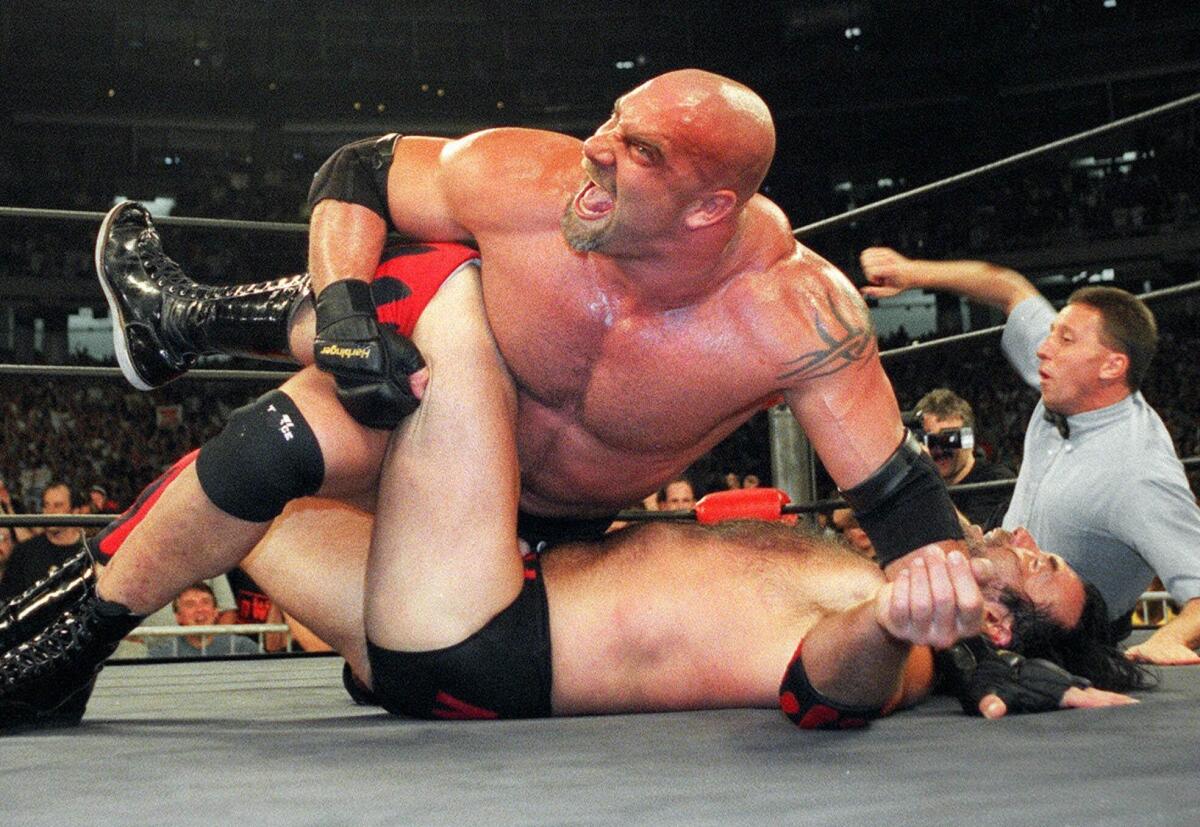Why is #MasculinitySoFragile?

World Championship Wrestling heavyweight Bill Goldberg puts Scott Hall to the mat during a WCW match July 6, 1998 in Atlanta.
Does buying a rose gold iPhone 6s make you gay?
Sorry, that’s a dumb question. How could a color determine your sexual orientation – and even if it did, why would that matter?
But it’s a question that has been floating around on Twitter, and one that Anthony Williams, a sociology major at UC Berkeley, finds alternately hilarious and sad – especially because behind that question is the suggestion that being gay equals being less of a man.
Tuesday night, Williams began tweeting using the #MasculinitySoFragile hashtag, in an effort to talk about violence and harassment that women face daily. Overnight, the hashtag started trending.
Williams woke up to death threats.
“When you challenge masculinity, it hits a nerve,” Williams said in a phone interview with The Times. “It makes some men nervous. But violence against women is a result of the fragility of masculinity. A woman can say ‘no’ to a man on a date, and she could end up dead. That’s what women have to deal with. And we as men have to recognize that.”
By Wednesday morning, the hashtag had broadened to include a conversation on the hypersensitivity of many men, and how they police their own sexuality and perceived “manhood.”
Last month, University of North Texas senior Abdul Dremali was working out in the gym when another man walked by, pointed at his bright pink shoes, and said:
“Hey, nice shoes ... ," using an anti-gay slur.
Annoyed, he went home and made a video on his YouTube channel, where he frequently talks about social issues. He tweeted the video out again Wednesday, with the #MasculinitySoFragile hashtag.
Dremali, who was born in Palestine and grew up in Egypt, knew that the slur was meant as an insult on his masculinity, and puzzled at why the man was so focused on his sexual orientation. “In Egypt, guys will hold hands with their best friends. It’s no big deal,” he said in an interview with The Times.
But he thought it even stranger that the products he used would make him less “masculine.”
“Yeah, sometimes I wear pink shoes or wear cucumber melon deodorant,” Dremali said in his video. “That doesn’t make me any less of a man. It just means that I have ridiculous shoes and my armpits smell like a delicious salad sometimes.”
Products that pander to men’s insecurities may be a symptom of the fragility of the masculine ego.
Kleenex has sold a “man size” version of its facial tissues for decades. Axe sells a loofah for men, but because “loofah” may sound too feminine, it calls it a “detailer shower tool” – like something one would use to clean up a sports car.
Last year, pictures of a male-oriented version of Q-tips went viral. The product appears to be exactly the same as the genderless cotton swabs, but the packaging features a metallic background, and the words “Men’s Ultimate Multi-Tool.”
An email to Unilever asking about potential difference in pricing or added functionality of the “Men’s Ultimate” version of the product was not answered.
Often, the fragility of the masculine ego can have even tangible, and dire, effects on men themselves. Men tend to take poor care of their own physical health, and do not visit doctors as often as women. Entire programs have been developed to convince men that it’s OK to take care of themselves.
The epidemic is so serious that it has spawned a site – mantherapy.org.
The site itself is a parody of masculinity. Visitors to the site are greeted by the fictional “Dr. Rich Mahogany,” who is surrounded by books, sports trophies and a moose head on the wall. He speaks in sports metaphors and professes his hatred of Spandex.
The site may seem like a joke, but it was created to address a serious issue: Men take their own lives at a rate nearly four times higher than women but are far less likely to seek help when feeling depressed. The site gives visitors an 18-point mental health quiz to “assess levels of anger, depression, substance abuse, and anxiety,” and recommends self-help procedures or professional help, as needed.
But the site does not pretend to fix the root cause of the issue: that masculinity is so fragile that men are afraid to seek help. A white paper PDF made public by the site’s creators is explicit about this, when it quotes a psychologist who says that “hoping men will become more like women” will lead to failure, and the deaths of more men.
The white paper instead recommends showing a man how to “stitch up [his] own wound like Rambo.”
In recent years, more people have had the opportunity to explore a version of masculinity that is not so confining. “Metrosexuality” was an early mainstream example of this, and social media like Twitter and Tumblr have contributed to even more nuanced understandings of gender.
But this has also caused a backlash of men who feel the need to put up ever higher walls against the tides of positive change. That’s what brought about the rise of “meninism” – a cynical movement that seems to exist for the sole purpose of mocking feminism and women.
But this, and the backlash of tweets from angry men on Twitter that have invaded the #MasculinitySoFragile hashtag only proves the point of the hashtag.
The fear of emasculation is so ingrained in our society that it can make men violent, and make men afraid to touch each other or buy a pink iPhone.
That’s how fragile masculinity is. It is so fragile that it can be exploited to sell cotton swabs.
And it can even be fatal.
Follow me @dexdigi for more on the intersection of culture and the Internet.
